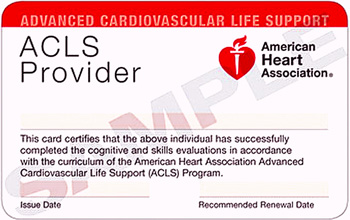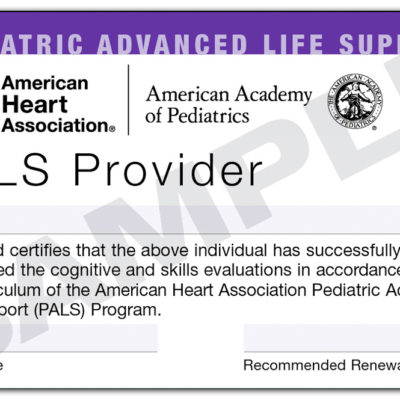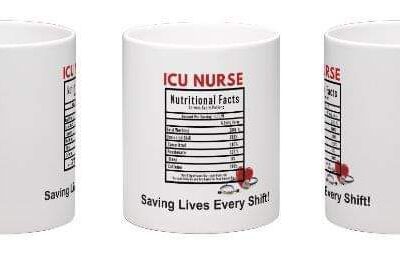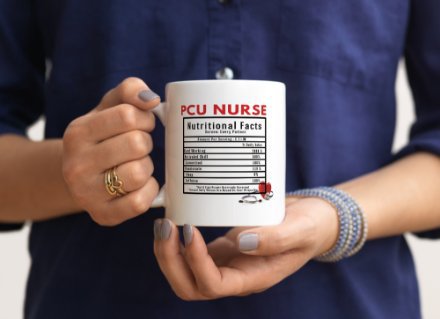Description
Fees
Course Registration Fee: $160
Provider Manual: Rental $20 Purchase $45
Prerequisite: Current BLS AND ACLS provider card
Required: AHA ACLS Provider Manual ( can rent or purchase)
Course is intended for healthcare providers who:
- Previously completed a ACLS course and have a solid understanding of the ACLS provider content
- have an unexpired ACLS card
- Participate or direct a cardiopulmonary arrest or cardiovascular event
Prior to the course:
The participant is expected to:
- have a current BLS AND ACLS Provider card;
- review the AHA ACLS Provider Manual;
The ACLS course builds on the foundation of lifesaving Basic Life Support (BLS) for Healthcare Providers skills. It emphasizes the importance of continuous, high-quality CPR and the importance of team dynamics, communication, systems of care, and immediate post-cardiac arrest care. Airway management and related pharmacology are also covered in this ACLS course.
Small and large-group sessions are utilized to teach skills in a stress free environment followed by testing stations where case-based scenarios are presented. In order to successfully complete the course, you must demonstrate skills competency at all learning stations and pass the CPR and AED skills test, bag-mask ventilation skills test, and a Megacode test. In addition, a 50 question written test must be passed with a minimum score of 84%. Upon successful completion, students will receive
an ACLS Provider card that is valid for two years.
an ACLS Provider card that is valid for two years.
To be successful in any ACLS course, students should be able to identify ECG rhythms and should know pharmacology specific to cardiopulmonary arrest and other cardiopulmonary emergencies before beginning the course. It is strongly recommended that students review the ACLS course materials and complete a pre-course self-assessment using the tools in their student materials before starting the course.
Course Includes:
• Key changes in advanced cardiovascular life support, reflecting
the 2015 American Heart Association Guidelines for Cardiopulmonary
Resuscitation and Emergency Cardiovascular Care
• Basic life support skills, including effective chest compressions,
use of a bag-mask device and use of an AED
• Recognition and early management of respiratory and cardiac arrest
• Recognition and early management of cardiac rhythms that may precede cardiac arrest conditions such
as symptomatic bradycardia
• Airway management
• Related pharmacology
• Management of acute coronary syndromes (ACS) and stroke
Team dynamics
• Effective communication as a member and leader of a
resuscitation team
• Effective communication as a member and leader of a
resuscitation team
Upon completion of the ACLS certification course you will know how to manage and respond to nearly all cardiopulmonary emergencies. Upon completion of this training you will be able to:
- Describe the BLS Primary Survey and ACLS Secondary Survey with critical actions.
- Describe the important elements of effective resuscitation team dynamics.
- Describe the clinical situations in which the following airway adjuncts may be used for airway management: oropharyngeal airway (OPA), nasopharyngeal airway (APC), bag-mask ventilation, and advanced airway.
- Recognize VF and VT on the ECG.
- Recall indications, contraindications, doses, and routes of administration for drugs recommended for refractory VF/Pulseless VT.
- Follow the ACLS initial assessment and management recommendations in the ACLS algorithms.
- Apply the 8 Ds of stroke care and explain why timely action is crucial.
- Describe the major signs and symptoms of stroke





Reviews
There are no reviews yet.